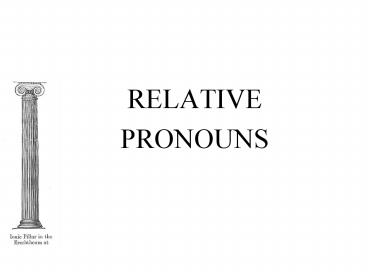RELATIVE - PowerPoint PPT Presentation
1 / 11
Title:
RELATIVE
Description:
RELATIVE PRONOUNS What is a relative pronoun? A pronoun that introduces a subordinate clause and connects that clause with some preceding noun or pronoun. – PowerPoint PPT presentation
Number of Views:82
Avg rating:3.0/5.0
Title: RELATIVE
1
- RELATIVE
- PRONOUNS
2
What is a relative pronoun?
- A pronoun that introduces a subordinate clause
and connects that clause with some preceding noun
or pronoun. - The relative pronoun relates or refers a
descriptive phrase to a noun or pronoun.
3
IN ENGLISH
- WHO Refers to persons
- WHICH Refers to things
- THAT Refers to both
- WHAT
4
Exempli Gratia
- The boy who lives next door, collects stamps.
- The word boy is the antecedent or the word which
is being described or referred to in the clause. - Who is the pronoun that relates or refers the
antecedent to the subordinate or descriptive
clause.
5
- NB The subordinate clause acts like an
adjective. It describes the antecedent. - In English, which and that do not change form to
indicate case. But, who does - nominative (subject) - who
- possessive - whose
- objective - whom
- These forms are used for both singular and plural.
6
Plurum exemplorum gratia
- I saw the queen who rules Britain.
- The boy whose book I have is our friend.
- You saw the man to whom I gave the book.
- The town that he saw was small.
- The schools from which we came were large.
- Enemies were the men with whom you used to battle.
7
IN LATINSINGULAR
8
PLURAL
9
ANTECEDENT PRONOUN CLAUSE
- The relative pronoun agrees with the antecedent
in gender and number, but the case of the
relative pronoun depends on its use in the
subordinate clause
10
EXEMPLI GRATIA
- I saw the queen who rules Britain.
- Vidi reginam quae Brittaniam regit.
- The boy whose book I have is our friend.
- Puer cuius librum habeo est amicus noster.
- You saw the man to whom I gave the book.
- Virum cui librum dedi vidisti.
11
- The town that he saw was small.
- Oppidum quod vidit erat parvum.
- The schools from which we came were large.
- Ludi ex quibus venimus erant magni.
- Enemies were the men with whom you used to
battle. - Inimici erant viri quibuscum pugnabatis.































